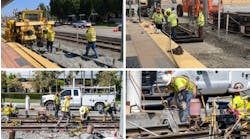Metro-North Adds 187 Weekend and Off-Peak Trains Each Week
Schedule changes that represent Metro-North Railroad’s biggest and most ambitious service expansion in its 30-year history begin Sunday, April 7. The new timetables will include increased off-peak and weekend train frequencies as well as faster service to many customers.
This second round of service investments provides an additional 187 trains per week in addition to the 56 trains added last October. Together this is an increase of 5.6 percent in the number of trains Metro-North operates each week.
“By adding off-peak and weekend trains and by adding stops at key stations, we are able to increase frequency and provide faster trip times systemwide,” said Metro-North President Howard Permut. “Coupled with Metro-North’s reputation for reliability, we expect that this extraordinary service expansion will make the railroad more attractive than ever and that it will become the travel mode of choice to millions more in New York and Connecticut.”
Key improvements include: 85 additional weekday and 22 additional weekend trains on the Hudson Line; 65 additional weekday and six additional weekend trains on the Harlem Line; and nine additional weekend trains on the New Haven Line.
On the Hudson Line the improvements will:
• Provide new half-hourly service at Spuyten Duyvil, Riverdale, and Irvington stations during weekday off-peak times and most of the day on weekends. This increase is warranted as ridership continues to grow at these stations. To accomplish this at no additional cost, about 20 trains per day on weekdays and about 30 trains on Saturdays and 23 trains on Sundays will make these additional stops.
• Provide three trains per hour at Ossining and Tarrytown, which are two of the highest ridership stations on the Hudson Line.
• Provide additional service at most Hudson Line Bronx stations in the key reverse commuting time periods.
• Provide additional Upper Hudson Line service on weekdays and weekends at key high-ridership and reverse commuting time periods.
On the Harlem Line the improvements will:
• Provide new half-hourly service at larger stations during the key higher-ridership times of the day on weekdays between Southeast and GCT.
• Provide additional PM Peak service between GCT and Southeast.
• Provide three trains per hour during select off-peak hours at Scarsdale and Hartsdale, and four trains per hour at White Plains and North White Plains stations, all of which are the highest ridership stations on the Harlem Line.
• Provide additional half-hourly service on Sunday between North White Plains and GCT.
New Haven Line:
• Provide additional half-hourly service on Sunday between Stamford and GCT.
In addition, a rock slope remediation project will take place from April 8 through June 2 on the Harlem Line between Pawling and Harlem Valley-Wingdale. To accommodate this project, trains will be replaced by buses between 9 a.m. and 5 p.m. on weekdays, and between 9 a.m. and 3 p.m. on Sundays. The bus schedules will be included in the April 7 Harlem Line timetables.
In the railroad’s West-of-Hudson territory, Port Jervis Line trains will return to the pre-Hurricane Sandy schedules effective Sunday, March 24, as NJ Transit continues to improve service as the post-Sandy recovery continues.
In the morning peak, five trains that had been making stops in New Jersey will no longer do so, resulting in travel time savings of up to eight minutes. In the evening peak, two trains that had been making extra stops will no longer do so resulting in travel time savings of up to nine minutes.
NJ Transit schedule changes system wide will result in minor adjustments to connections between Secaucus Junction and New York-Penn Station for Port Jervis Line and Pascack Valley Line trains.
The next schedule change is planned for July 1, on the New Haven Line only, to accommodate a capital construction project. The next full East of Hudson schedule change is planned for November 3. The next schedule change for the Port Jervis and Pascack Valley Lines is planned for May with an exact date to be determined.

